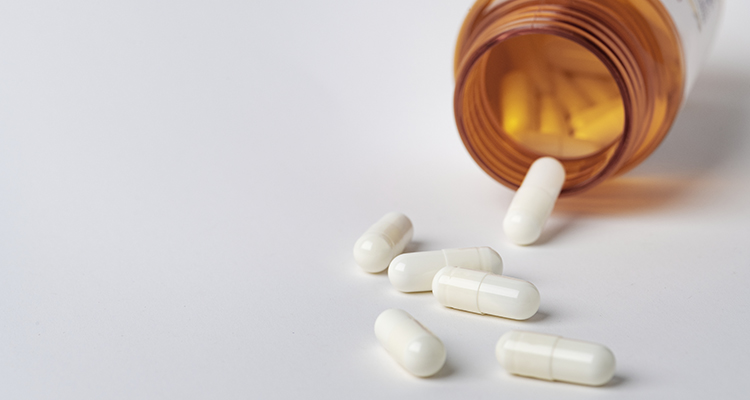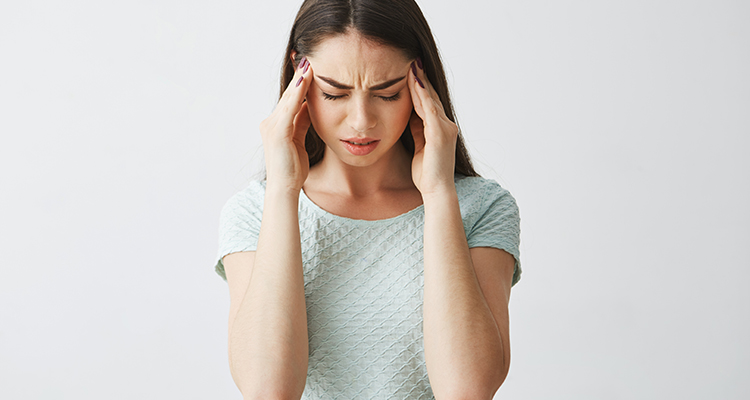OTC Sleep Aids: Understanding Your Options
Over 8.5 million people have used a prescription sleep aid in the last month to ease insomnia symptoms and other related sleep disorders. But what about those individuals that don’t have access to prescription medication or simply want fast, convenient, short-term relief? Many of them turn to OTC (over-the-counter) sleep aids as a solution. But with so many medications and supplements on the market, all promising to deliver fast, effective relief, how do you know which one is best or if they’re safe?

In this article, we’ll take a close look at your OTC sleep aid options, including risk factors, benefits, and recommended use.
Content
Important Facts About OTC Sleep Aids
When you’re suffering from insomnia, tossing and turning at night, or waking every hour on the hour, you may get desperate. Long-term sleep deprivation can have disastrous effects on your health – both mentally and physically. With nowhere else to turn, you may reach for the medicine cabinet or pharmacy for an over-the-counter sleep aid that promises to deliver the relief you need. But before you pop a few pills, there are a few important things you should know about OTC sleep medications.

For starters, these medications are intended for short-term use. That means, even if they offer you relief at the moment, it’s not recommended that you take them for longer than 14 days. Once you stop taking them, you may find yourself right back where you started or even worse off. This is known as rebound insomnia and it’s a legitimate concern when taking OTC sleep aids.
Another concern is tolerance, which happens quickly and often in cases of over-the-counter sleep aids. Tolerance occurs when your body becomes accustomed to the sedative effects of these medications and, therefore, a normal dose no longer has the desired results. In time, you may find yourself needing more of the medication, more often. If you continue taking the recommended dose, chances are, it won’t offer the same relief it once did.
Lastly, some OTC sleep aids that are not prescribed may leave you feeling groggy, disorientated, or drowsy the next day. This may cause you to feel an overwhelming need to nap or ingest caffeinated products which may then negatively impact your sleep the following night, creating unhealthy sleep patterns.
The Most Common OTC Sleep Aids
Now that you know some of the potential risks of taking over-the-counter sleep medications, let’s discuss options. Here are some of the most widely recognized and used OTC sleep aids and what you can expect from each one.

Antihistamines
Certain antihistamines actually contain sleep aids and work to block your brain’s natural histamines from interfering with your sleep-wake cycle. Histamines in the body signal when it’s time to wake up and be alert. When you take an antihistamine like Benadryl, these messages are blocked, leaving you feeling tired and drowsy.
Keep in mind, though, that most antihistamines aren’t meant for use as a sleep aid and come with unwanted and unpleasant side effects including constipation, trouble urinating, dry mouth, and blurry vision. It’s recommended you only take an antihistamine when you’re suffering from cold or flu symptoms that are interfering with your sleep and not for insomnia relief.
Melatonin
Melatonin may be the most widely used and recognized sleep aid and natural sleep supplement currently on the market. One reason is that melatonin is a hormone naturally produced by the human brain as a response to darkness. Healthy levels of melatonin help regulate your circadian rhythm, making it easier for you to fall asleep at night and wake in the morning to feel alert and well-rested. This is one reason it’s recommended you don’t use digital devices before bed. Exposure to certain blue light from these screens can block your body’s natural production of melatonin, making it increasingly difficult to fall asleep.
One way to combat this or increase your ability to fall asleep at night is to take an OTC sleep aid containing this beneficial sleep hormone. Most melatonin supplements are made using animal hormones, microorganisms, or other synthetic ingredients. These types of OTC sleep aids work to ease certain conditions including circadian rhythm sleep disorder, sleep-wake phase disorder, shift work disorder, and certain sleep disorders in children. You may also find relief from jet lag due to a recent trip to a different time zone.
As of this writing, the FDA (US Food and Drug Administration), classifies melatonin as a dietary supplement, which means it’s not regulated or approved for use as a sleep aid. Some people may have a melatonin allergy but not know it. Individuals with epilepsy or on blood thinners shouldn’t take an OTC medication containing melatonin without first consulting with a doctor. Potential side effects include headache, nausea, and daytime fatigue.
Valerian
Another natural supplement that’s found its way into a lot of OTC sleep aids is valerian. Valerian root is an herb that is often marketed and sold as more of a dietary supplement than a sleep aid. Valerian is also found in mind sedatives used to treat both anxiety and insomnia. Research on the efficiency of valerian is still ongoing but researchers believe that the herb interacts with serotonin, adenosine, and GABA receptors in the brain, which all have a direct effect on the body’s central nervous system and, therefore, on your ability to sleep.
Similar to melatonin, because valerian is a dietary supplement it’s not FDA approved nor is it subjected to the same level of evaluation as other drugs or sleep medications. It’s important to note that OTC sleep aids containing valerian root differ drastically in terms of how much of the herb each pill contains and how it will affect your body. High doses of valerian have been linked to excessive daytime drowsiness. Other reports indicate that a normal dose of 600 mg or less doesn’t affect alertness, concentration, or reaction times.
Diphenhydramine
Unlike the last OTC sleep aids, diphenhydramine is an FDA-approved antihistamine that also offers relief from acute insomnia. Benadryl is the more commonly known form of this drug, but diphenhydramine is also contained in many OTC fever-reducing and pain-relieving medications including Tylenol PM, Advil PM, Excedrin PM, and ZzzQuil. Most medications containing diphenhydramine are suggested for short-term use only.
Despite the fact that this ingredient is found in many OTC sleep aids, its efficacy is still up for debate. Some users reported that the recommended 50 mg dose of this particular sleep aid has minimal effects on their sleep. In other cases, taking diphenhydramine before bed has resulted in reduced wakefulness the next day and some psychomotor impairments which interfere with the connection between your brain and muscle function.
Diphenhydramine is also the most common OTC sleep aid used among older adults and often leads to dependency. Studies show that elderly individuals are at higher risk of developing insomnia and suffering from poor sleep quality. This is usually due to underlying health conditions including heart disease, diabetes, hypertension, and chronic pain. The problem is, that as you age, your metabolism slows down, extending the half-life of most OTC sleep aids and prolonging their effects. In some cases, this causes a residual sedative effect even when diphenhydramine is taken as directed.
If you’re a young adult or adolescent considering diphenhydramine for insomnia relief, there are a few other considerations to make. The FDA warns that high doses of this drug in particular can cause dangerous medication issues including heart attack, seizure, coma, and even death.
Doxylamine
Doxylamine is similar to diphenhydramine in the fact that it’s a first-generation antihistamine known for its sedative effects. In some cases, this drug can act as an OTC sleep aid and offer short-term relief for insomnia. It’s also commonly used as a nasal decongestant to relieve cold symptoms ranging from sneezing and coughing to runny nose and body aches.
Some common OTC sleep aids that contain doxylamine include Medi-Sleep, Good Sense Sleep Aid, and Unisom SleepTabs. In addition to insomnia relief, you may also find these OTC medications help relieve pain and reduce fever. If you choose to take doxylamine for insomnia but your symptoms persist for more than 14 days, you should stop use and contact your doctor. As with most sleep aids on this list, medications containing doxylamine are not intended for long-term use and shouldn’t be used to treat chronic insomnia. When taken for cold and flu symptoms, you should limit your intake to just 7 days. It’s also important to note that over 30 other medications can negatively interact with doxylamine, including acetaminophen and aspirins, which is why you should always consult with a doctor before taking an OTC sleep aid. Another similarity between doxylamine and diphenhydramine is that they’re the most common sleep aids used among individuals over the age of 65. Sadly, this can cause serious health impairments and side effects, especially if the individual consumes alcohol regularly.
CBD
CBD is quickly becoming a go-to supplement for a myriad of medical conditions and ailments from chronic pain and anxiety to digestive issues, migraines, and more. It was only a matter of time before people started turning to this chemical as a way to ease insomnia symptoms. One reason CBD is so effective is that it works to treat many of the underlying causes of insomnia including pain, anxiety, and other mood disorders.
To be clear, CBD is not the same thing as THC and doesn’t contain hallucinogenic properties. Although CBD is extracted from the marijuana plant, it only contains .3% of THC or less, making it legal in many places. CBD comes in many forms including oil, gummies, pills, patches, and creams, making it a versatile treatment option, depending on your ailment. While there’s still extensive research being done on CBD and its positive effects on the human body, countless users report even small amounts of CBD have helped ease their pain, discomfort, or stress, making it easier to fall and stay asleep and drastically improving their sleep quality. Before purchasing or ingesting products containing CBD check your local laws and legislation.
The Potential Risks and Side Effects of Using OTC Sleep Aids
All medications come with a certain level of risk and the potential for side effects. The best way to ensure you’re taking a safe and healthy OTC sleep aid is to speak with a healthcare professional that knows your health history and background. Additionally, the more you know about each OTC sleep aid option, the more informed a decision you can make.

Here are some of the most common side effects associated with the above-mentioned medications.
Antihistamines
- Drowsiness
- Dizziness
- Headache
- Low blood pressure
- Rapid heartbeat
- Constipation
- Difficulty urinating
- Blurred vision
- Dry mouth and eyes
Melatonin
- Depression
- Dizziness
- Headache
- Nausea
- Bedwetting
- Excessive daytime fatigue
Valerian Root
- Headache
- Upset stomach
- Dry mouth
- Cognitive impairment
- Nightmares or strange dreams
- Excitement or arousal
- Daytime drowsiness
Diphenhydramine
- Disturbed coordination
- Dizziness
- Epigastric pain
- Thickening of bronchial secretions
Doxylamine
- Thickening of mucus in the throat and nose
- Dry mouth, throat, and nose
- Excessive drowsiness
- Dizziness
CBD
- Decreased appetite
- Dry mouth
- Diarrhea
- Excessive drowsiness and fatigue
- Upset stomach
- Dizziness
- Low blood pressure
In most cases, OTC sleep aids are safe when used according to the instructions and under the supervision of a doctor. However, they should still be used with caution and only as a means of short-term relief from insomnia and certain insomnia triggers. Daytime grogginess is a common side effect of most of these OTC medications and can cause impaired functioning the next day. This may lead to an increased need for insomnia relief, drug dependency, or worsening insomnia.
You should also avoid consuming alcohol when taking an OTC sleep aid as this may severely impact and intensify the effects. Never combine two OTC sleep aids or an OTC supplement with a prescription sleep aid. If you develop a tolerance to any of these medications, do not increase the dose without speaking to a doctor first. Remember, any sleep aid or supplement containing melatonin, valerian root, or CBD isn’t regulated by the FDA, which means the possible effects are ultimately unknown. It also doesn’t guarantee that the product actually contains what the label states. This can be very dangerous for individuals currently taking other medications or facing a serious medical diagnosis.
Tips for Safely Using OTC Sleep Aids
Just because OTC sleep aids come with certain risks doesn’t mean you can’t safely take them for short-term relief. With enough research, you can find an over-the-counter medication or supplement that works best for your current condition and state of health.
Here are a few more tips for safely taking OTC sleep aids.

Speak with Your Doctor
This is step number one when taking any new medication or supplement. Even if you are perfectly healthy, without any underlying health issues, and aren’t currently taking any other medications, you should still confer with your doctor before taking an OTC sleep aid. They can also recommend the right dosage for your age, weight, and condition.
Consider the Risks
If the risks or side effects of the OTC sleep aid you’re considering are worse than the condition itself, it may not be worth taking them. You also need to consider any potential health problems you have. For example, doxylamine and diphenhydramine can cause serious complications in those with urinary issues, ulcers, and glaucoma. Women who are breastfeeding or pregnant should also avoid these types of OTC sleep aids. Individuals 65 or older are at an increased risk of dementia.
You also need to be aware of the potential side effects of these sleep aids and how they might affect your ability to function. For example, daytime drowsiness or grogginess could make it difficult and dangerous to operate machinery, drive a car, or perform other activities that require you to be alert and focused. Don’t take a sleep aid if you can’t dedicate at least 8 hours to sleep.
Understand the Purpose of OTC Sleep Aids
It’s important to know that there’s no quick fix for insomnia and other sleep disorders. Even if these OTC sleep aids offer short-term relief, they shouldn’t be used as a long-term solution. Not only will tolerance get in the way of this, but you’re also at risk of dependency and addiction. If you can’t trust yourself to stop the use of these medications after the recommended time frame, it may be best to avoid them altogether.
Adopt a Healthy Lifestyle and Get the Sleep You Need and Deserve
When insomnia has you down, you can use some of these OTC sleep aids for temporary relief. But before you do, be sure to carefully read the potential risks and side effects and speak with your doctor about drug interactions. It’s also important to remember that these over-the-counter solutions aren’t meant for long-term use. If you’re suffering from chronic insomnia and the devastating effects of long-term sleep deprivation, chances are, you need a different approach.

Cognitive behavioral therapy for insomnia is one of the most effective and healthiest ways to overcome insomnia and other sleep disorders. Using different therapies and proven methods, you can adopt healthier patterns of behavior and make lifestyle changes that have long-lasting impacts on your sleep quality and overall health.
Don’t wait. Click here to start your journey today.













